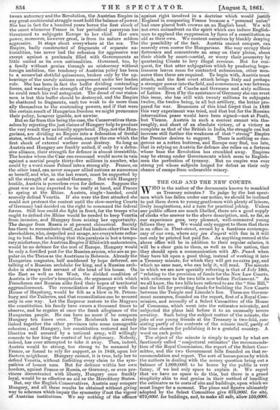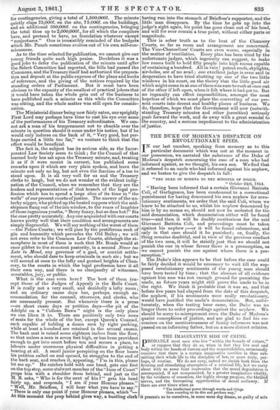THE OLD AND THE NEW COURTS.
WHO is the author of the documents known to mankind as Treasury minutes ? To judge by the last speci- men which has fallen under our notice, we should be inclined to put them down to young gentlemen with plenty of leisure, lively imaginations, and a turn for practical joking. Unless our public offices are much libelled, there are a good supply of clerks who answer to the above description, and, so far, as our experience goes, very pleasant, well-mannered young fellows they are. We would only suggest to them that there is an office in Fleet-street, owned by a facetious contempo- rary of our own, where any jeu d'esprit with fun in it will not only be printed but paid for. As anything earned at the above office will be in addition to their regular salaries, it will be a clear gain to them, as well as to the nation, that they should open a communication with Mr. Punch when they have hit upon a good thing, instead of working it into a Treasury minute, for which they will get no extra pay, and which no sane man, who can help it, will read. The minute to which we are now specially referring is that of July 16th, "relating to the provision of funds for the New Law Courts, with reference to the two bills now before Parliament." As we all know, the two bills here referred to are the " Site Bill," and the bill for providing funds for building the New Courts between the Temple and Lincoln's Inn. These are Govern- ment measures, founded on the report, first of a Royal Com- mission, and secondly of a Select Committee of the House of Commons, which went into the estimates minutely, and subjected the plans laid before it to an unusually severe scrutiny. Such being the subject matter of the minute, the joke of our young friends at the Treasury is two-fold, con- sisting partly of the contents of the minute itself, partly of the time chosen for publishing it to a grateful country. A word on each point. The object of the minute is simply to upset by what are facetiously called "conjectural estimates" the recommenda- tion of the Royal Commission, the report of the Select Com- mittee, and the two Government bills founded on that re- commendation and report. The sort of hocus-pocus by which the authors in dealing with the money question bring out a balance of 1,099,000/. to be borne by the public is very funny, if we had only space to explain it. We regret that we have no space to do this, but there is a grand simplicity akin to real genius in their method of handling the estimates as to costs of site and buildings, upon. which we must linger for a moment. The plans and figures ultimately adopted by the Select Committee give 675,000/. for site, 675,000/. for buildings, and, to make all safe, allow 150,0001. for contingencies, giving a total of 1,500,000/. The minute quietly claps 75,0001. on the site, 75,000/. on the buildings, and an additional 350,000/. on the contingencies, bringing the total thus up to 2,000,0001., for all which the compilers have, and pretend to have, no foundation whatever except "conjectures." One is irresistibly reminded of the budgets which Mr. Punch sometimes evolves out of his own self-con- sciousness.
As to the time selected for publication, we cannot give our young friends quite such high praise. Doubtless it was a good joke to defer the publication of the minute until after the Select Committee had reported, the bills had passed the Commons, and theTreasurvitself had authorized the prepara- tion and deposit at the public expense of the plans and books of reference, and the giving of the notices required by the standing orders of Parliament. But it must have been obvious to the capacity of the smallest of practical jokers that it would have taken the whole grin out of the business to have published such a minute as this while the Committee was sitting, and, the whole matter was still open for conside- ration.
The Ministerial dinner being now fairly eaten, our sprightly First Lord may perhaps have time to cast his eye over some of the performances of his Treasury subordinates. We can- not ask a man of his temperament not to chuckle over the minute in question should it come under his notice, but if he would only indorse on the back of it, "Very good, but per- haps carried a little too far," we venture to think that the effect would be beneficial.
The fact is' the subject has its serious side, as the Incor- porated Law Society seem to think ; for the Council of that learned body has sat upon the Treasury minute, and, treating it as if it were meant in earnest, has published some remarks upon it which are very plain spoken, and leave the minute not only no leg' but not even the fraction of a toe to all stand upon. It is a very well for us and the Treasury clerks to laugh, but we do not wonder at the evident indig- nation of the Council, when we remember that they are the leaders and representatives of that branch of the legal pro- fession which has to spend a large slice of its time in" the wells" of our present courts of justice. The answer of the un- lucky nigger, who picked up the heated coppers which the mid- shipmen flung out of the inn window, to the roars of laughter of those ingenious youths," Berry funny, but so dam hot!" fits the case pretty accurately. Any one acquainted with our courts knows pretty well that their condition and arrangements are simply disgraceful. We will say nothing of the worst of them —the Police Courts ; we will pass by the pestiferous reek of gin and humanity which pervades the Old Bailey ; we will not even refer to the Common Law Courts, although the at- mosphere in most of them is such that Mr. Reade would at once gibbet to the remotest posterity, in a second Never too Late to Mend, any governor of a gaol, or convict settle- ment, who should dare to keep criminals in such air ; but we will ascend at once to the lofty and genteel heights of Chan- cery, to the courts in which the legal profession have it all their own way, and there is no clamjamfry of witnesses, constables, jury, or public.
What is the case even here ? The best of them (ex- cept those of the Judges of Appeal) is the Rolls Court. It is really not a very small, and decidedly a lofty room • and on ordinary cause days has, perhaps, enough ac l commodation for the counsel, attorneys, and clerks, who are necessarily present. But whenever there is a press —on short cause days or petition days—the pit of the Adelphi on a "Colleen Bawn " night is the only place we can liken it to. There are positively only two rows of seats for the whole of the bar, except Queen's Counsel, each capable of holding a dozen men by tight packing, while at least a hundred are retained in the several causes. The back seat is raised some eighteen inches from the floor, so that unless a man is seven feet high, or has been provident enough to get into court before ten and secure a place, he labours under enormous physical difficulties in getting a hearing at all. A small junior perspiring on the floor hears his petition called on and opened, he struggles to the end of the back seat, and reaches it, appealing, "I'm in this, please let me up." He catches hold with one hand, gets one foot on the top step, some stalwart member of the "Inns of Court" props him with a shoulder from behind, and just as the M. R asks, "Who is for the next of kin ? " gets his head fairly up, and responds, "I am if your Honour pleases." "Well, Mr. Briefless, I will hear what you have to say." "There is only one point if your Honour pleases, which "- At At this moment the prop behind gives way, a bustling clerk having run into the stomach of Briefless's supporter, and the little man disappears. By the time he gets up into the judge's sight again, his point has gone clean out of his head, and will for ever remain a true point, without either parts or magnitude.
This is sober truth as to the best of the Chancery Courts, so far as room and arrangement are concerned. The Vice-Chancellors' Courts are even worse, especially in the matter of ventilation. Every plan has been tried by the unfortunate judges, which ingenuity can suggest, to make low rooms built to hold fifty people into high rooms capable of containing a hundred. All in vain ! patent roofs, skylights, air-holes, are of no avail ; one excellent judge is even said in desperation to have tried shutting up one of the two little windows in his court, on the theory that the little good air which might come in at one of them was sure to rush at once out of the other if left open, when it felt where it had got to. But no ingenuity can effect impossibilities, amongst the most hopeless of which we must place the converting of our pre- sent courts into decent and healthy places of business. We do, therefore, hope that the Government will now (notwith- standing Treasury minutes and other jocosities) seriously push forward the work, and do away with a great scandal to the country, and a serious impediment to the administration of justice.































 Previous page
Previous page